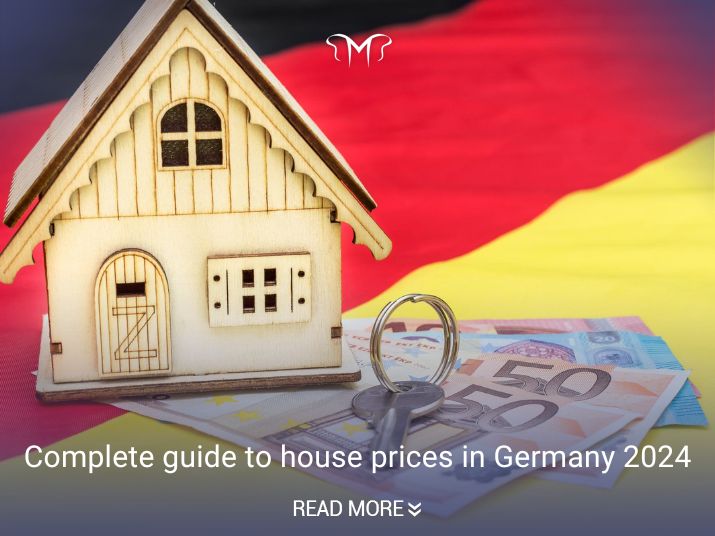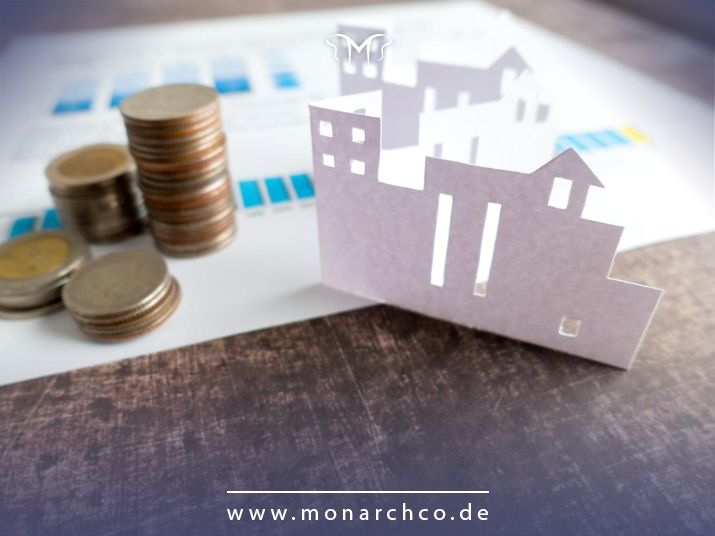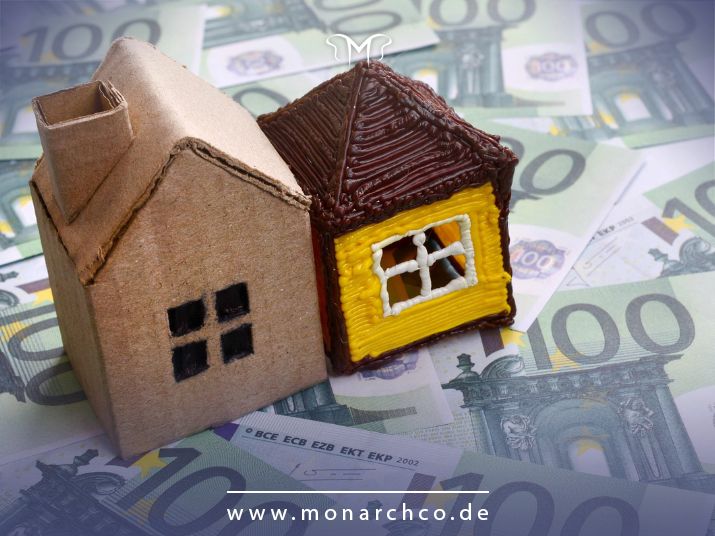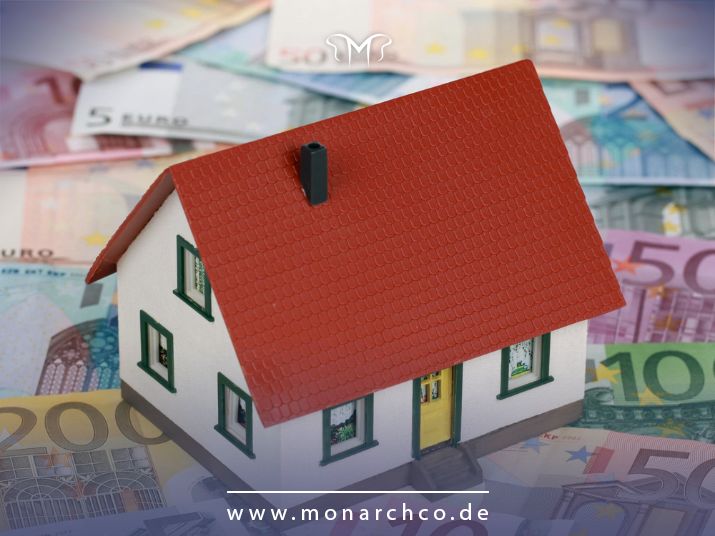
Complete guide to house prices in Germany 2024
Germany, as the largest economy in Europe, boasts a strong and diverse real estate market. Known for its high living standards, robust economic performance, and rich history, the country has attracted many foreign migrants over the years. Germany's real estate market, with its high growth potential, not only creates investment opportunities but also helps newcomers find their desired accommodation easily. Some prefer buying a home while others opt for renting. Regardless, it's essential to research home prices in Germany before embarking on any venture. In this article from the "Monarch Immigration Institute" website, we thoroughly discuss the house prices in germany.
Steps to Buying a House in Germany
Buying property in Germany involves several steps that must be carefully followed to avoid any potential losses. If you are interested in purchasing property in this country, it is advisable to consult with an experienced lawyer to ensure a smooth process. This guarantees that the procedures are entirely legal and allows you to rely on the returns from your investment. Additionally, European countries generally have numerous tax laws that buyers must comply with. As mentioned earlier, buying property in Germany does not automatically grant you residency; you can only obtain a long-term tourist visa, allowing you to travel to and from Germany.
If you are eligible for residency in Germany through property purchase, it is essential to familiarize yourself with the process. After searching for and finding the desired property through real estate offices, and completing the purchase and transfer of ownership as previously mentioned, you should use a lawyer who is well-versed in international law. This ensures a secure transaction for both parties due to differences in legal, tax, and investment systems among countries. The general steps for buying property in Germany are as follows:
1. Drafting a Preliminary Contract: Initially, the seller must prepare a draft contract that includes details such as the property's value, payment method, and down payment amount. If the buyer approves this draft, they must deposit 10% of the property's price as a down payment into the notary's account.
2. Paying Property Taxes: The buyer has about four weeks to pay the property tax. The tax amount varies by city, ranging from approximately 3% to 7% of the property's value.
3. Finalizing the Contract: In the final step, a contract between the buyer and seller is signed and executed.
If the buyer does not have residency in Germany, they can travel to and from Germany with a long-term tourist visa.

House Prices in Germany: How Much?
House prices in Germany vary depending on the city you intend to reside in and the type of property you wish to purchase. Housing prices in Germany have increased over the past decade. Research by the European Union Commission has shown that prices increased by about 94% between 2010 and 2022, while the average price increase in the European Union is 45%. Short-term price increases have also occurred in recent years.
Data from the German Federal Statistical Office (Destatis) indicate that prices increased by over 10% for four consecutive quarters between 2021 and 2022 compared to the previous year. A Reuters survey of housing analysts in May 2022 led to predictions of a 7% increase in 2022, a 3% increase in 2023, and a 2% increase in 2024.
Real estate in some German cities is cheaper compared to other European cities. Most properties in German cities are apartments, while more villas are available in suburban areas. Generally, rural homes are cheaper than urban ones.
While 280,000 new houses are built annually in Germany, some experts argue that this number is insufficient. For domestic and foreign investors, German real estate is a stable and reliable investment. However, returns may be weak in some areas.
Some tax incentives previously available to investors have also been removed. For many migrants, purchasing property in Germany is only feasible for longer stays due to the 25% capital gains tax (plus solidarity surcharge) applied to any property owned for less than 10 years.
House Prices in Major Cities of Germany
If you're considering buying a house in Berlin or one of its suburbs, your options will be limited. Due to the high population of renters in Berlin, you're likely to see properties available for rent rather than purchase. Prices in Berlin are higher than the national average but cheaper than cities like Munich and Frankfurt.
There's a wide spectrum of housing types in Berlin. In the city center, you'll find older urban houses and apartment blocks alongside modern high-rise buildings. Suburban areas like Zeuthen (south of central Berlin) are popular and more affordable. Further north, Hohen Neuendorf offers a quieter atmosphere.
Munich tops the list as the most expensive city to buy a house in Germany. Besides high house prices, the cost of living in this city is significantly higher than anywhere else in Germany. In the annual ECA cost of living report, Munich ranks as the sixteenth most expensive city in Europe for expatriates.
The high housing costs in Munich are balanced by the excellent quality of life in the city. Similar to Berlin, apartments make up a significant portion of Munich's housing, with larger houses more common in the city's outskirts. Statistical data from the Numbeo website shows the cost of buying a house per square meter in some German cities:
| outside the city |
Downtown |
City |
| 8562 euros |
11573 euros |
Munich |
| 5270 euros |
8070 euros |
Hamburg |
| 5836 euros |
8314 euros |
Berlin |
| 4926 euros |
7876 euros |
Frankfurt |
| 3729 euros |
5182 euros |
Cologne |
| 3066 euros |
4333 euros |
Hanover |
Renting vs. Buying a House in Germany
The decision between renting and buying a house in Germany is one that many individuals face. This choice depends on various factors, which are outlined below:
Initial Costs:
Buying a house requires either securing a mortgage (if available) or paying the full purchase price upfront (if not using a mortgage). In contrast, renting involves paying a security deposit and monthly rental fees.
Ownership Costs:
Owning a house includes expenses such as property taxes, home insurance, maintenance and repair costs, and social fees. These costs must be considered. On the other hand, renting means you avoid these expenses, which are the landlord's responsibility.
Flexibility:
Renting offers more flexibility to relocate. If you need to move due to work or life changes, you can leave without incurring significant costs. However, if you own a house, you must either sell your previous home or rent it out to others.
Investment:
Buying a house can be viewed as a long-term investment. The value of the house may increase over time, allowing you to benefit from this appreciation. Renting, however, is considered a direct expense with no similar potential for value increase.
Housing Market Conditions:
The housing market conditions and the rent and purchase prices in a specific area of Germany can influence your decision. In some cities, renting may be very expensive, while in others, it might be the best option.
Given these factors, the decision between renting and buying a house in Germany should be carefully considered. It is advisable to consult with real estate and financial experts to make the best choice for your interests.
Buying a House in Germany with a Bank Loan
Individuals residing in European countries who are engaged in economic activities have the opportunity to use government loans. This option is not limited to citizens; in most cases, residents can also benefit from bank loans. This is because these individuals work like citizens of that country and thus pay government taxes. The same applies to Germany, where you must have residency status to use bank loans for purchasing property. Therefore, you must first obtain residency through other means, such as working in Germany or registering a company in Germany. Only then will you be eligible for government services, particularly bank loans. European bank loans are typically low-interest and long-term.
Factors Affecting House Prices in Germany
It is important to note that the real estate market is complex, with numerous factors influencing property values. The location is the most significant factor. Generally, property prices in urban areas, especially in major cities like Berlin, Munich, and Hamburg, are higher than in rural areas. The age of the property, square footage, and proximity to amenities such as public transportation, schools, shopping centers, and parks can also impact prices.
The overall health of Germany's economy plays a crucial role. Factors such as Gross Domestic Product (GDP) growth, employment rates, and income levels can influence housing demand. When interest rates are low, people are more inclined to take out housing loans, leading to increased demand and house prices in Germany.
Supply and demand equilibrium is a key driver of prices. Housing supply shortages, especially in high-demand areas, can drive up prices. Government policies, including tax incentives, can significantly impact the real estate market. For example, changes in property taxes or housing subsidies can affect prices.
Investments in infrastructure projects such as new transportation networks or the development of commercial areas can increase the attractiveness of specific regions and help boost property values. Ultimately, global economic conditions such as international trade dynamics and geopolitical events can influence investor confidence and impact real estate markets, including those in Germany.

Affordable Housing Prices in Germany
The affordability of houses in Germany varies significantly depending on the region, city, and neighborhood. Generally, you may find more affordable housing options in rural areas or smaller towns compared to larger cities. Keep in mind that the real estate market is dynamic, and prices can fluctuate over time. Here are some areas in Germany where property prices may be relatively lower:
- Some areas in former East Germany such as Mecklenburg-Western Pomerania, Saxony, and Thuringia have lower costs compared to western regions.
- Certain areas in Lower Saxony, Bremen, and Hesse in northern Germany are less expensive compared to cities in the south.
Cheapest Cities in Germany for Buying and Renting
Below we mention affordable cities in Germany for buying or renting a house:
1- Leipzig
Leipzig is one of the most cost-effective cities in Germany. The cost of living in this city is low, making it an attractive option for many immigrants. Located in eastern Germany, Leipzig has a rich history and culture. The housing market in Leipzig is very reasonable, with the price per square meter of a house in this city reaching 800 euros.
2- Duisburg
Duisburg is located in western Germany, in the heart of the Ruhr region. This city is known for its industrial heritage and also has a very affordable housing market. Properties in Duisburg are sold at an average price of 1200 euros per square meter, which is significantly lower than the average in other parts of the country.
3- Chemnitz
Chemnitz is another city in eastern Germany known for its low cost of living and affordable housing prices. In recent years, the city has experienced significant economic growth, making it an excellent option for those looking for an inexpensive home in a growing area. The average property price in Chemnitz is a thousand euros per square meter.
4- Magdeburg
Magdeburg is a city whose popularity has been increasing in recent years. Located in eastern Germany, it is a very good option for people looking for affordable housing prices. Properties in Magdeburg are sold at an average price of 1300 euros per square meter, which is relatively low compared to other cities in the country.
5- Halle
Halle is located in eastern Germany and is a good option for immigrants. The city has a rich history and culture and is a good place to live for people who enjoy outdoor activities. Properties in Halle are sold at an average price of 1200 euros per square meter.
6- Gorlitz
Gorlitz is a city in eastern Germany located near the border with Poland. The city has excellent transportation infrastructure that will further develop in the future. Properties in Gorlitz are sold at an average price of 1100 euros per square meter, making it a good option for immigrants.

Important Points Before Buying Property and Houses in Germany
- Research the real estate market in the specific area or city where you intend to buy. Understand current trends, price levels, and potential future developments.
- Before starting your search, analyze house prices in Germany and the types of properties in the area. If considering a property that needs renovation, find local laws and regulations.
- Visit a potential property at different times of the day to get an idea of factors such as noise pollution and traffic levels.
- Buying property in Germany, like any other country, requires careful planning and thorough research. Here are some points to consider before buying property in Germany:
- Familiarize yourself with German real estate laws and regulations. Consulting with a local legal specialist specializing in real estate may be helpful.
- Consider all costs associated with buying property, including official document fees, property taxes, agency fees, and other transaction costs.
- Choose the location carefully. Consider proximity to amenities, public transportation, schools, and other factors that may affect property value.
- Be prepared to negotiate the purchase price. It is common in Germany for buyers and sellers to negotiate the final price, and the quoted price is often considered a starting point.

Germany has a stable and growing economy, reflecting low inflation in the country. This allows the country to position itself internationally as a desirable market for profitable and reliable long-term investments. In Germany, there are no restrictions for non-residents to purchase property. However, the rental market in this country is very popular, and most residents opt for rental options.


